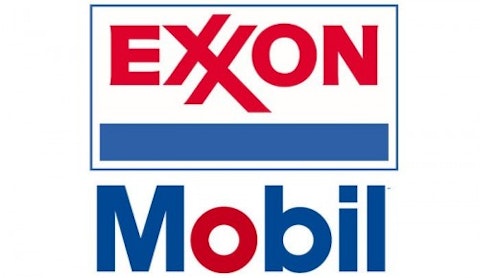Related Tickers: Exxon Mobil Corporation (NYSE:XOM), Chevron Corporation (NYSE:CVX)
Can Chevron Beat Exxon Mobil for Oil Supremacy? (Wall St. Cheat Sheet)
A quick glance at the Fortune 500 list of top American companies reveals Exxon Mobil Corporation (NYSE:XOM) at number two and Chevron Corporation (NYSE:CVX) at number three. Despite the slight decline in worldwide prices, it is a good time to be an oil giant, yet investors who are considering which company has the greater potential need support for their decisions. Is Exxon or Chevron the better candidate for long-term oil supremacy?
Exxon Mobil Corporation (NYSE:XOM) checks in at $450 billion in revenue (a $45 billion profit), while Chevron brings in $234 billion with just over $26 billion in profits. That gives Chevron Corporation (NYSE:CVX) a higher profit margin of 0.7 percent and Exxon Mobil a far greater market cap. For investors interested in dividends, Chevron offers 3.3 percent compared to 2.8 percent from Exxon Mobil.

A Turkish firm will form a partnership with the Kurdistan Regional Government (KRG) and Exxon Mobil Corporation (NYSE:XOM) to carryout oil exploration in northern Iraq. According to Turkish industry sources, Turkish Petroleum International Company (TPIC), an arm of state-run Turkish Petroleum (TPAO) is expected to be the likely partner, reported Reuters. The Arab-led central government in Baghdad and Kurdish-run northern enclave have a dispute over controlling oilfields and territory and sharing of crude oil revenues. Exxon Mobil Corporation (NYSE:XOM) is the first company to sign up for exploration deals with the KRG, while Chevron, Total and Russia-based Gazprom, Neft are the other companies that have signed exploration deals.
Exxon still examining Arkansas oil spill (UPI.com)
Exxon Mobil Corporation (NYSE:XOM) is still looking for the cause of the March rupture of the Pegasus pipeline in Arkansas before restating the line, a spokesman said. A 22-foot rupture on the Pegasus oil pipeline spilled about 5,000 barrels of a diluted form of Canadian crude oil into an Arkansas neighborhood in late March. The state’s attorney general requested extensive information from the company and it was issued a corrective action order from the Pipeline and Hazardous Materials Safety Administration. Exxon Mobil Corporation (NYSE:XOM) said it has most of the standing oil removed and has moved into a long-term remediation phase. Company spokesman Aaron Stryk told Inside Climate News that despite replacing the damaged section of pipe, it hasn’t been restarted.
The Time Exxon Went Into the Semiconductor Business (and Failed) (The Atlantic)
Zilog was founded by Intel veterans Federico Faggins and Ralph Ungermann in 1974. Their first microprocessor, the Z80, was a hit. But Zilog’s success brought trouble in an unlikely form: Exxon Mobil Corporation (NYSE:XOM). First, Exxon made a large investment in exchange for 51 percent of the company. Then, they bought Zilog clean out, despite its next-generation 16-bit microprocessor, the Z8000, not having tremendous success. It was downhill from there. And by 1985, having invested a billion dollars, Exxon sold the company back to some of its employees and the investment firm Warburg Pincus. What I soon discovered, though, was that Exxon was not alone in trying to make money off the computing boom. As Forbes recalled in 1997, many companies went chasing tech growth and came up empty-handed or worse.
ExxonMobil’s Excellent Algae Biofuel Adventure…Or Not (CleanTechnica)
Not that Exxon Mobil Corporation (NYSE:XOM) is going all soft on us, but the company once notorious for promoting bad information about the state of climate science has been quietly researching algae biofuel in partnership with California-based Synthetic Genomics Inc. (SGI) for the past four years, and it just announced a new co-funding agreement last week. This new phase of the partnership is significant because it enables SGI to focus on foundational research to develop enhanced strains of algae, rather than seeking a quickie commercial solution. Whether that’s a good thing or a bad omen remains to be seen.
